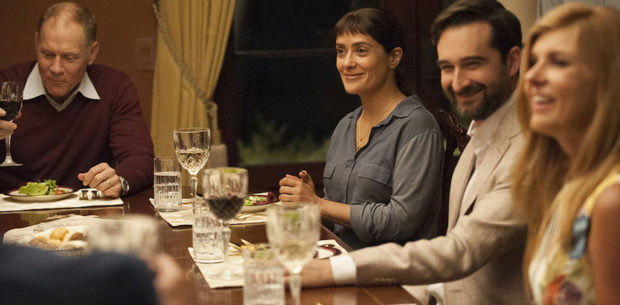Things never seem to go well for films built around dinner parties. It’s either murder most foul or comedies of error whenever cinema invites us around for tea. Sometimes its a little bit of both.
BEATRIZ AT DINNER is no exception. Eclectic filmmaker Miguel Arteta returns to adult comedy after a brief foray into family films (Alexander and the Terrible, Horrible, No Good, Very Bad Day) with a satire (of sorts) that doesn’t always follow the expected paths. Opening on a foreboding image of a boat being paddled along the muddy banks of a mangrove swamp, it sets up a simple social dichotomy that plays out over the course of an evening in a place that is as far removed from that as possible.
In the film, holistic medicine practitioner Beatriz (Salma Hayek) attends the dinner party of her wealthy client Kathy (Connie Britton) after her car breaks down. Yet the arrival of land developer Doug (John Lithgow) brings up some old memories, and Beatriz can’t help but speak her socially conscious mind.
There’s a beating heart of angry justice at the centre of this film. Like most fish-out-of-water scenarios, the titular Beatrice is a hand grenade thrown into a closed environment. Yet while Mike White’s (The Emoji Movie) script is often filled with humour, there is something more serious lurking beneath the surface of the dinner party motif.
The unapologetically industrialist Doug leads the conversation, with gems like “Did you come here legally?” drawled in Beatrice’s direction. The dinner would have otherwise been a conservative echo chamber were it not for her presence, one that reinforces their preconceived notions or rationalises their one-percenter outlook to themselves. “It’s true what they say,” goes one thread. “Those animals would be gone were it not for the hunting.”
The increasingly tipsy Beatrice does not allow them any quarter, especially when she recalls a personal connection to Doug’s building projects. If her presence is tolerated, then her questions threaten to unravel the fabric of the self-fulfilling prophecy they’ve constructed.
BEATRIZ AT DINNER doesn’t necessarily come to a satisfying ending, losing sight of its own narrative thread, and never fulfilling the promise of the slow burn that built up to it. Yet maybe that’s the point. In a tension filled final act, Beatriz must choose between being true to herself or fighting fire by giving in to it. Her choice may not be what you’d anticipate, but also demonstrates the impotence that the masses feel in the face of a system that is built to keep people like Beatriz out. So death to capitalist pigs and all that!
[stextbox id=”grey” bgcolor=”F2F2F2″ mleft=”5″ mright=”5″ image=”null”]2017 | US | DIR: Miguel Arteta | WRITERS: Mike White | CAST: Salma Hayek, John Lithgow, Connie Britton, Jay Duplass, Amy Landecker, Chloë Sevigny, David Warshofsky | DISTRIBUTOR: Roadshow Films (AUS) | RUNNING TIME: 83 minutes | RELEASE DATE: 21 September 2017 (AUS) [/stextbox]





